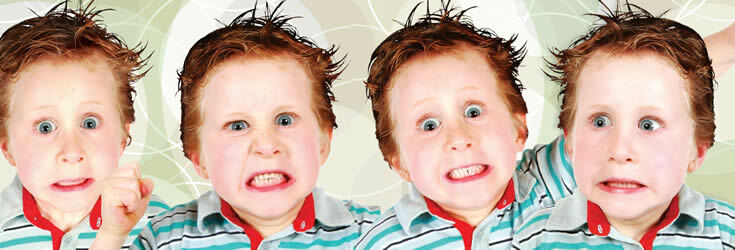Tourette's Syndrome: Symptoms and Treatment
 Tourette's syndrome refers to disorders of the central nervous system, which is manifested by so-called tics - involuntary, repetitive movements or sounds that the sick person is unable to control.For example, people can make different sounds, shout out obscene words, shrug their shoulders or blink often.
Tourette's syndrome refers to disorders of the central nervous system, which is manifested by so-called tics - involuntary, repetitive movements or sounds that the sick person is unable to control.For example, people can make different sounds, shout out obscene words, shrug their shoulders or blink often.
The disease usually occurs in childhood and adolescence, but most often occurs at the age of five to six years.In males, Tourette's syndrome is more common than in the female half.Such a condition is considered incurable, and the treatment is reduced to alleviating a morbid condition.For many patients, tics that develop are not causing any inconvenience and treatment is absolutely not required. At the end of the puberty, the frequency of the appearance of ticks decreases and it becomes possible to control them. Table of contents: History of Tourette's syndrome The causes of the development of de la Tourette's syndrome Symptoms of Tourette's syndrome Diagnostic measures General principles of treatment of Tourette's syndrome
History of Tourette's syndrome
This syndrome was first described by Gilles de la Tourette,A pupil of a psychiatrist from France, Jean-Martin Charcot.The doctor based his conclusions on the description of observations of a group of patients consisting of nine people.Not much earlier, in 1825, the French physician Jean Itar published an article describing the symptoms of seven men and three women, very similar to the symptoms described by Tourette.But the very first mention of a similar disease occurs in 1486 in the book "Hammer of Witches", which tells about a priest with vocal and motor tics.
Causes of Tourette's syndrome
Tourette's syndrome refers to poorly studied conditions, and it is rather problematic to talk about the reasons for its appearance.Meanwhile, there are a number of factors that influence the occurrence of this pathology.
For identified reasons that can lead to the appearance of pathology, include:
- brain damage obtained during labor or as a result of oxygen starvation( hypoxia);
- smoking, drinking alcohol and drinking coffee during the period of gestation;
- is a pronounced toxicosis of the first half of pregnancy in a future mother.
All of the above signs can lead to Tourette's syndrome, but not at all the fact that the disease will arise completely.
There is a theory that the disease is transmitted genetically.But this hypothesis has not been fully proved, however, and has not been disproved.It is noteworthy that although both sexes are affected by the disease, at the same time, every ill girl has two or three boys.Science has not been able to identify either the genes or their groups that are responsible for the transmission of the disease. According to observations, it is revealed that even near relatives can have symptoms that are completely different, and of varying severity, and in some cases the defect can be transmitted in an asymptomatic course.
Some autoimmune processes can strongly influence the appearance and severity of the course of Tourette's syndrome, while not being the cause of the disease itself. Pediatric neuropsychiatric autoimmune disorder( PANDAS), provoked by streptococcal infection, worsens the course of the disease in children, and may be the main cause of its occurrence.
The most likely theory of development of the considered disease is the violation of neural connections in the cerebral cortex - with Tourette's syndrome there is a failure in the work of the thalamus .This area of the brain controls the transmission of signals from all senses, except for the sense of smell, directly to the cerebral cortex.There is a direct relationship between impaired connections and the manifestation of symptoms of the disease.

Symptoms of Tourette's syndrome
The main manifestation of Tourette's syndrome is the presence of ticks, sudden, short, often repetitive movements or screams. All tics are divided into simple and complex.Simple, called repetitive, short, unexpected actions of one group of muscles.Complicated are the same actions, but performed by several muscle groups.
In addition, ticks are divided into vocal( voice) and motor, that is, motor.
 To simple tics can include such manifestations as the movement of the mouth, sniffing, blinking eyes, moving the eyes up and in the side, jerking his head.Complex tics are more diverse and are expressed by jumping, various touching, copying movements and gestures of other people( echopraxia), body rotations, indecent gestures, eccentric gait, attempts to sniff around surrounding objects.
To simple tics can include such manifestations as the movement of the mouth, sniffing, blinking eyes, moving the eyes up and in the side, jerking his head.Complex tics are more diverse and are expressed by jumping, various touching, copying movements and gestures of other people( echopraxia), body rotations, indecent gestures, eccentric gait, attempts to sniff around surrounding objects.
With simple voice ticks, the patient can bark, grunt, groan, cough or clear the throat.In the case of complex vocal tics, phrases or single words can be repeated, curses or abusive words( coprolalia), repeated phrases and words after other people( echolalia) may be repeated.
Important! Tiki in a state of illness, with stress, fatigue, anxiety, strong emotional excitement can be greatly intensified and increase.They manifest themselves in a state of wakefulness, and in a dream.
Emerging in childhood, until the peak of the pubertal period, ticks can increase.After the end of puberty, the severity and incidence of Tourette's syndrome usually decreases, and the patient can learn to suppress them with willpower, feeling the approach of a tick.On the eve of an attack a person feels an unpleasant tension that resembles a trembling or itching.Teak is the discharge of such a state.
Tourette's syndrome, in addition to external manifestations, does not cause any harm to human health.The development of the child's organism proceeds within the limits of the norm.This statement applies both to physical development, and to the mental and mental.Life expectancy is observed within the natural norm.A person suffering from this disorder is not at all limited in the social and social aspects of life.
Diagnostic measures
 Diagnosis of Tourette's syndrome, as such, does not exist.A corresponding diagnosis can be made based only on the patient's complaints and the collection of anamnesis.Symptoms of the disease can be considered the presence of several symptoms.The presence of motor and voice ticks is suggested for reflection, and their manifestation is not necessarily a joint one.
Diagnosis of Tourette's syndrome, as such, does not exist.A corresponding diagnosis can be made based only on the patient's complaints and the collection of anamnesis.Symptoms of the disease can be considered the presence of several symptoms.The presence of motor and voice ticks is suggested for reflection, and their manifestation is not necessarily a joint one.
Ticks should be shown repeatedly during the day, repeated quite often, and this picture should last for one year or more.The onset of the disease is usually recorded in childhood or adolescence.
Please note: The doctor must ensure that tics are not caused by taking medication and are not provoked by other illnesses.After all, the same flashing of eyes can be caused by ophthalmological pathologies, and frequent nasal scurvy - are associated with an elementary allergy.
You can exclude the possibility of other diseases only by assigning additional studies to the .For example, various blood tests, magnetic resonance imaging and many others.It is necessary to conduct psychological tests such as a test for attention deficit, or a test for obsessive-compulsive disorders.
General principles for the treatment of Tourette's syndrome
Tourette's syndrome is considered an incurable condition.But usually treatment, as such, is simply not required by .Treatment can be prescribed to facilitate the control of tics drugs that reduce the severity of symptoms.
Medical therapy
 The drugs from the group of neuroleptics that block dopamine receptors are prescribed. This can be Galdol( Haloperidol), Fluphenazine, Orap( pimozide) and others.All these drugs have a fairly good effect on the control of tics, but it should be noted that their long-term use is addictive and can lead to depression.
The drugs from the group of neuroleptics that block dopamine receptors are prescribed. This can be Galdol( Haloperidol), Fluphenazine, Orap( pimozide) and others.All these drugs have a fairly good effect on the control of tics, but it should be noted that their long-term use is addictive and can lead to depression.
Drugs used to treat hypertension are well suited for these purposes, for example, Tynex( Guangfascin), Catapres( Clonidine).Reception of these medicines can be burdened with drowsiness.
Some patients are well helped by anticonvulsants used to treat epilepsy( Topamax, Topiramate).If the disease is accompanied by an anxious condition, longing, then antidepressants will help( Sarafem, Prozak).To block some muscle groups, Botox injections( Botulinum toxin) are used.
Non-pharmacological therapy
From non-drug treatment of Tourette's syndrome, psychotherapy can be considered the most effective.This technique affects not only the underlying syndrome, but also the disorders that accompany it.For example, anxiety, depression, obsessive-compulsive state, a syndrome of hyperactivity with attention deficit and others.
Interesting! Some sources describe the method of deep stimulation of the cerebral cortex, in which special electrodes are implanted in the brain.Then an electrical impulse is applied to them, which acts on the receptors of the cortex of the region of the brain responsible for the appearance of tics.Some experts say about the high efficiency of this technique, but there is a huge risk of damage to the brain substance.For this reason, this method was not widely used.
Tourette's syndrome causes more psychological harm to the patient than physical.Especially considering the fact that most children are exposed to the disease, special attention should be given to the psychological state of the child.He can be very shy about his condition, become isolated in himself, refuse to communicate with others.
It's no secret that child cruelty has no boundaries and the child can be subjected to ridicule, even harassment, from peers.In such cases, he needs protection and assistance from the parents.It is necessary to tell about the disease to teachers, classmates and people from the closest environment.It is advisable not to allow overwork of the child during classes, or to conduct training in a sparing mode.
It is very important to improve the self-esteem of the child in every possible way, to explain to him that he is not different from peers and his problem is not ugliness, he is just a little bit different.In no case can you scold the child for ticks, especially the voice.It should be strongly encouraged his communication and friendship with other people.If you can find a support group for children with such deviations, then this will be the ideal solution to the problem.
Tourette's syndrome is not a dangerous disease that does not disturb the body's functions.But it is very hard to tolerate psychologically, that's why it is necessary for such patients to visit a psychologist - it is psychotherapy sessions that will help them to adapt socially and lead a full-fledged, active way of life, and not become a recluse.
Konev Alexander, internist



